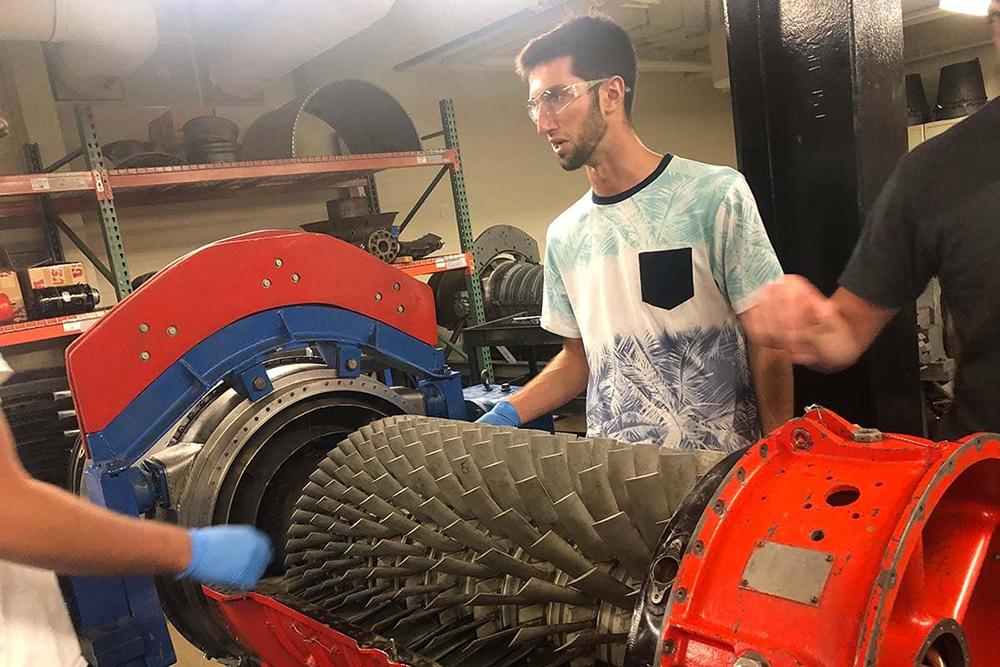Commercial Space, AAM Could Become Stiff Competition for MRO Workforce Talent

Commercial aviation has always had to compete with other technical industries for talent, but it may soon face even more heavy competition from emerging industries such as commercial space and advanced air mobility (AAM).
According to Marshall Tetterton, associate professor of Aviation Maintenance Science (AMS) at Embry-Riddle Aeronautical University, the trend of graduates being poached by other industries such as power generation and manufacturing is now being compounded by growing demand for technically skilled workers at companies such as SpaceX and Blue Origin, which have hired more than a dozen students from Embry-Riddle’s AMS program over the past six years.
“Our students are in demand to commercial space firms, in my opinion, because the program here at Embry-Riddle covers and prepares them for a wide variety of disciplines—such as composites, hydraulics, structural, pneumatics, electrical and powerplant systems—and the core focus is around troubleshooting,” says Tetterton.
Although the majority of Embry-Riddle’s AMS graduates are still going on to work at airlines, Tetterton says new aerospace technologies are proving to be a draw for younger generations. “It is my experience talking to students that, initially, they enter into the A&P program with the idea that they will get jobs within the airline industry. However, as they progress through the program they begin to gravitate towards a specific area, like corporate aviation, airlines, general aviation or the space industry,” he says. “As the number and frequency of rocket launches increase, more and more interest is moving into the space field.”
Tetterton says Embry-Riddle continually tries to incorporate new technologies into its AMS curriculum, such as electric propulsion, composites, virtual reality, data analytics, cybersecurity and unmanned aircraft systems (UAS). Students can choose to take these courses as electives or pursue them as concentration areas for bachelor’s degrees once they have obtained their Airframe & Powerplant (A&P) certificates.
“That’s why some of these companies like hiring our graduates, because they’re getting more than just an A&P certificate,” he says. “Companies find out we’re doing all of these things in addition to the Part 147 [curriculum] and that’s why they’re pulling a lot of our students to all these other areas.
While Tetterton says Embry-Riddle has not seen much in the way of recruiting from AAM companies yet, its growing UAS curriculum could tip things in that direction. The university just added a UAS maintenance course last semester and plans to increase its enrollment next year due to high student demand. It also offers a bachelor’s degree in UAS systems.
Despite these emerging technology areas drawing heavy interest from younger students, Tetterton thinks the MRO industry will still fall short of the 626,000 new aviation maintenance technicians Boeing projects will be needed over the next 20 years. In addition to the technician retirement wave, he says aviation maintenance schools simply aren’t scaled to produce enough qualified graduates.
Tetterton says the aviation industry is telling schools they need quadruple the technicians they are churning out, but “we don’t have the facilities to do that. We’re already at capacity. Our classes are full all the time. It’s a problem I don’t think anybody has a magic answer for,” he says. “[Schools] need more facilities, more equipment and more faculty. You can’t just arbitrarily triple the size of the class because you have training aids and labs. You can’t take a class that’s normally set up for 25 people and put 50 or 75 people in it. It’s not an easily solvable situation.”
Although many airlines are already putting partnerships and programs into place to help more graduates enter the industry, Tetterton says their resources will be a key factor in actually scaling up capacity. “Airlines are going to have to step up and help schools expand,” he says. “The good part to it is that students are pretty much guaranteed to get a job because demand is outpacing supply.”





